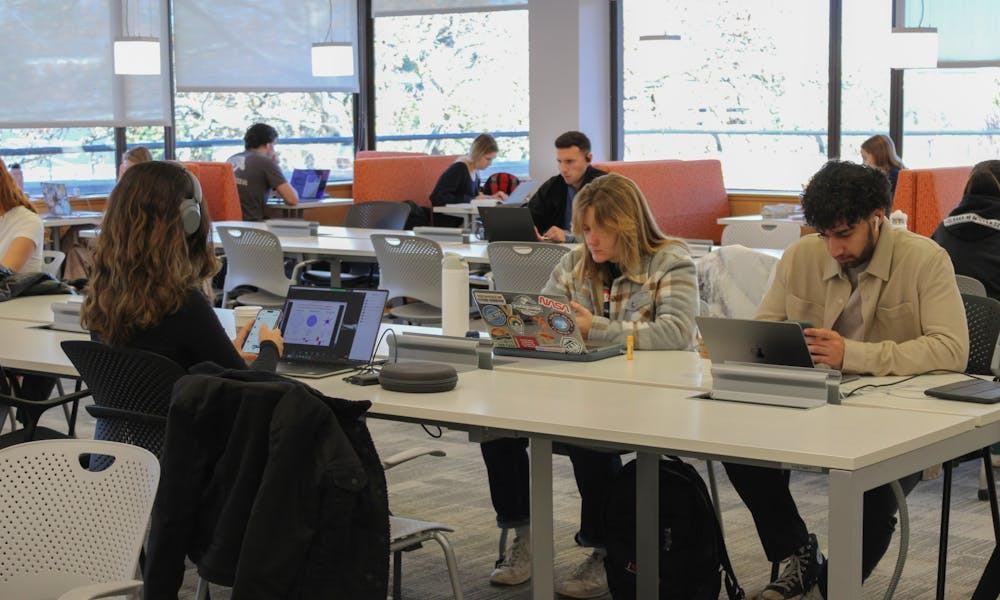As the new year begins, students are setting resolutions and looking for ways to start fresh, both personally and academically. This season of renewal presents the perfect opportunity to reflect on personal growth while maintaining an academic balance. LPPL 2100, “The Resilient Student,” offers a unique opportunity to discuss and study personal life skills in an academic environment and is applicable to students of many different backgrounds. This course equips the student with powerful tools to not just be a resilient student, but a resilient person beyond the grades on paper. Because of the benefits of this course, the University should work to thoroughly encourage students to take personal development courses, perhaps even making these courses part of the general education curriculum.
LPPL 2100 integrates readings from statistical studies, psychology and cognitive sciences as academic disciplines which guide class content and prove how personal development operates. While this interdisciplinary approach is hugely important to the course, the real benefit of LPPL 2100 lies in its pedagogy, which is consciously executed through carefully-structured assignments, designed to provoke self-reflection, growth and resilience. Resilience is the ultimate end goal of this course and boils down to being antifragile in the face of life’s unpredictability and obstacles. This is something from which everyone can benefit, but it is also something which requires extensive and conscious reflection.
Personal development courses as a whole bring the focus back to the student, independent of their academics and grades. This is best exemplified in the resilience project, a semester-long project in the LPPL 2100 designed by the student for the student's specific goals. This cornerstone project begins with a proposal outlining what the student wishes to work on, followed by a reflection on their progress. To make the journey tangible and data-driven, students create trackers and maintain journals to document their efforts. For example, a student aiming to grow spiritually might track prayers and reflect on the process each day. Another student who may struggle with social anxiety may opt to try to speak to one new person each day.
This project takes a daunting personal growth goal and breaks it down into day-by-day progress, made concrete with spreadsheets and graphs for grading purposes as well as a documentation of the student’s journey. While the complexity of the human mind can never be fully captured in representation like spreadsheets and graphs, the real development — something that is unquantifiable — comes from within. Documentation serves as a visual motivator for the resilience project, as well as a place for the student to reflect on the process.
Students oftentimes contrast the ability to harness professional skills with the focus on personal development. However, these are not diametrically opposed goals. Instead, the most important decision one could make that would benefit both of these paths is taking a personal development class. Arguably the most powerful aspect of personal development is its widely-applicable subject matter. It is not specific to any one department or major — any student at the University should take these courses to bolster their development and apply their acquired skills to their individual academic aspirations. These can manifest in a variety of ways — resilience, confidence and leadership are developed during this course and can be employed in various careers and over the course of one’s life.
For this reason, the University must rethink its approach to education beyond traditional major-specific requirements and mandate personal development courses. Traditional general education requirements are essential for foundational academic knowledge, but personal development courses create invaluable skills for students’ individual growth and their interpersonal relationships. Per U.Va.’s mission statement, the University prides itself on being “guided by a founding vision of discovery, innovation and development of the full potential of talented students from all walks of life.” Thus, the University has a responsibility to ensure that their students are prepared in all aspects of life. Unlike traditional general education requirements, which can sometimes feel like boxes to check, personal development courses serve as an investment in the student to learn about oneself and to grow into the best version of oneself.
As students, we often think that we must constantly be moving forward, doing everything they can to hasten graduation and go into the workforce. Contrary to this prevalent mentality, college courses should provide lessons that go beyond the classroom. College courses should enrich student life and spark change. The University’s promotion of personal development courses would embody these benefits, allowing them to make a lasting impact on students.
Heer Patel is an opinion columnist who writes about academics for The Cavalier Daily. She can be reached at opinion@cavalierdaily.com.
The opinions expressed in this column are not necessarily those of The Cavalier Daily. Columns represent the views of the authors alone.







